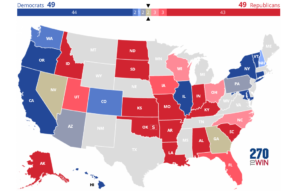As we prepare for the 2020 elections, Yesh Ginsburg and Steen Kirby will give a general overview of all 435 United States House of Representatives races. This is a basic overview to introduce you to the major candidates. All Partisan Lean numbers are taken from the Cook Partisan Voting Index. We will update this page as the races progress if anything noteworthy arises.
Georgia is too large of a state to break down in one article, so we’re going to split the 14 Congressional Districts into two articles. This article will look at Districts 8-14, the more Republican-heavy areas of the state. The other article will look at the first seven districts, where four of the Democrats’ five seats lie.
Georgia’s 8th Congressional District
Incumbent: Austin Scott (Republican, fifth term)
Partisan Lean: R+15
2018 Results:
| Candidate | Votes | % |
| Austin Scott (R) | 197,401 | 100 |
2016 Results:
| Candidate | Votes | % |
| Austin Scott (R) | 173,983 | 67.64 |
| James Harris (D) | 83,225 | 32.36 |
Republican Candidate:
Austin Scott (campaign website)
Scott is a consistent conservative Republican who easily wins this district time and again. He has the only real campaign apparatus in this district right now.
Democratic Candidate:
Lindsay Holliday
“Doc” Holliday does not seem to have a campaign website. The campaign seems to have no internet or social media presence, nor is it campaigning too actively locally.
Georgia’s 9th Congressional District
Incumbent: Doug Collins (Republican, fourth term)
Partisan Lean: R+31
2018 Results:
| Candidate | Votes | % |
| Doug Collins (R) | 224,412 | 79.51 |
| Josh McCall (D) | 57,823 | 20.49 |
2016 Results:
| Candidate | Votes | % |
| Doug Collins (R) | 256,535 | 100 |
Republican Candidate:
Andrew Clyde (campaign website)
Collins gave up this safe seat to try to unseat Kelly Loeffler in the Senate Special Election. Clyde came in second in the primary, but he won the runoff to take this seat. A small-government conservative, Clyde is running based on his personal issues with the IRS and to reform it so that, in his words, others don’t have to go through what he did.
Democratic Candidate:
Devin Pandy (campaign website)
Pandy also came in second in his primary before winning the runoff. Pandy is a moderate Democrat who is mostly running on ideas contrary to President Trump’s actions.
Georgia’s 10th Congressional District
Incumbent: Jody Hice (Republican, third term)
Partisan Lean: R+15
2018 Results:
| Candidate | Votes | % |
| Jody Hice (R) | 190,214 | 62.92 |
| Tabitha Johnson-Green (D) | 112,117 | 37.08 |
2016 Results:
| Candidate | Votes | % |
| Jody Hice (R) | 243,725 | 100 |
Republican Candidate:
Jody Hice (campaign website)
Hice is a staunch conservative who easily consistently carries this district.
Yesh’s notes: Like Clyde above, Hice’s campaign website has a central photo with Hice posing with a firearm. It’s not super-uncommon to see that from Republican candidates, though it’s definitely more prominent (and with bigger rifles) among the Georgia crew.
Democratic Candidate:
Tabitha Johnson-Green (campaign website)
Johnson-Green is running for a second consecutive election. She is a progressive Democrat running on a platform of Medicare for All and the Green New Deal (though she odes not use the Green New Deal language).
Georgia’s 11th Congressional District
Incumbent: Barry Loudermilk (Republican, third term)
Partisan Lean: R+17
2018 Results:
| Candidate | Votes | % |
| Barry Loudermilk (R) | 191,887 | 61.79 |
| Flynn Broady Jr. (D) | 118,653 | 38.21 |
2016 Results:
| Candidate | Votes | % |
| Barry Loudermilk (R) | 217,935 | 67.41 |
| Don Wilson (D) | 105,383 | 32.59 |
Republican Candidate:
Barry Loudermilk (campaign website)
Loudermilk is a consistent conservative who campaigns on lowering healthcare costs and limiting regulations that, in his opinion, hurt small businesses. It is noteworthy that Loudermilk doesn’t tout President Trump more on his campaign website, but he is conservative across the board.
Democratic Candidate:
Dana Barrett (campaign website)
Barrett describes herself as fiscally responsible, but her campaign planks are mostly big spending projects, including universal healthcare. (Not that those are necessarily not fiscally responsible, just that those bits of rhetoric don’t usually go together.) Barrett is actually spending almost on pace with Loudermilk for now, which seems strange in a district this generally not-competitive.
Georgia’s 12th Congressional District
Incumbent: Rick Allen (Republican, third term)
Partisan Lean: R+9
2018 Results:
| Candidate | Votes | % |
| Rick Allen (R) | 148,986 | 59.48 |
| Francys Johnson (D) | 101,503 | 40.52 |
2016 Results:
| Candidate | Votes | % |
| Rick Allen (R) | 159,492 | 61.6 |
| Tricia Carpenter McCracken (D) | 99,420 | 38.4 |
Republican Candidate:
Rick Allen (campaign website)
Allen is a small business owner who campaigns mainly on economic concerns. He has also jumped in on fighting the current “defund the police” rhetoric that comes up in some activist circles.
Democratic Candidate:
Liz Johnson (campaign website)
Johnson is running on a mixture of liberal and progressive policies. Severely out-funded in a decently red district, she is actually spending money and trying to seriously campaign.
Georgia’s 13th Congressional District
Incumbent: David Scott (Democratic, ninth term)
Partisan Lean: D+20
2018 Results:
| Candidate | Votes | % |
| David Scott (D) | 223,157 | 76.16 |
| David Callahan (R) | 69,760 | 23.80 |
2016 Results:
| Candidate | Votes | % |
| David Scott (D) | 252,833 | 100 |
Republican Candidate:
Becky Hites (campaign website)
Hites is running a conservative campaign with the notion of being nicer and more respectful at the forefront. Like Stanton King in the 5th District, she is claiming that sexual education “strips children of their innocence.”
Democratic Candidate:
David Scott (campaign website)
Scott is a relatively liberal Democrat who should safely carry this deep blue district.
Yesh’s notes: It’s worth noting that Scott faced a primary challenge from three other Democrats, mostly from his left. Scott barely cleared the 50% necessary to avoid a runoff. Usually that doesn’t signal good things for a candidate, but in this safe blue district that shouldn’t matter much.
Georgia’s 14th Congressional District
Incumbent: Tom Graves (Republican, fifth term)
Partisan Lean: R+27
2018 Results:
| Candidate | Votes | % |
| Tom Graves (R) | 175,743 | 76.5 |
| Steven Lamar Foster (D) | 53,981 | 23.5 |
2016 Results:
| Candidate | Votes | % |
| Tom Graves (R) | 216,743 | 100 |
Republican Candidate:
Marjorie Taylor Greene (campaign website)
Yesh’s notes: It’s hard to say anything about Greene without editorializing, so everything is going in the “notes” section. Greene is the only supporter of the QAnon conspiracy that is expected to be elected to Congress. (As I discussed in the Colorado primer, Lauren Boebert is not a QAnon supporter.) She is a staunch far-right conservative that talks a lot about fighting the far left. It is also worth noting that she seems to at least somewhat recognize her new stature as a likely Congresswoman, as she recently backed off from some 9/11 truther claims she implicitly endorsed. Does that change much about Greene? Not really. We have no idea what a QAnon supporter will look like in Congress, but we’re going to find out, and she will get plenty of attention.
Democratic Candidate:
Kevin Van Ausdal (campaign website)
Van Ausdal is a progressive Democrat running on a single payer healthcare system and a $20 minimum wage.
Yesh’s notes: It’s a left-wing campaign in a deep red district where the Republican candidate is deeply flawed. With a better candidate for the district, the Democrats might have had a chance against Greene, but Van Ausdal isn’t it.
Overview
Republicans control six of these seven seats. And while it’s almost certain to remain that way after November, there are definitely some interesting things to keep an eye on along the way.
Interested in the rest of our primers for other House races? We have them all listed on our primer home page.







